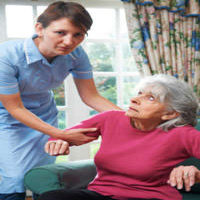Live 24/7 Call Answering: 609-881-1400

For instance, according to a study reported by Cornell University in 2011, only 1 in 24 episodes of elder abuse becomes known. Another study conducted by the National Research Council in 2003 estimated that less than 8% of elder abuse ever comes to the attention of authorities. And another study reported that as many as 24.3% of residents experienced at least one instance of physical abuse while in a nursing home.
So, how can you tell if your loved one is being neglected or is at risk for neglect? You have to look for the signs. What are the signs? Ask yourself, when you visit your loved one, have you seen any of the following common signs of neglect?
NURSING HOME NEGLECT “BY THE NUMBERS”
According to studies, the six most common types of Nursing Home Abuse are:
ROOT CAUSES OF NURSING HOME NEGLECT
Isolated failures by employees certainly happen. And, when they do, a nursing home lawyer will be liable for the negligence of their employees under a legal doctrine known as “respondeat superior” or “vicarious liability.” These legal theories impute the negligence of the employee to the nursing home.
However, a greater problem is the systemic neglect of the elderly by corporations more concerned with profit than safety. Neglect of this kind is a cancer, which has its roots in Nursing Home’s management culture. All too frequently, the owners and management of Nursing Homes deliberately cut safety corners or under-staff their facilities with the goal of driving more profit at the expense of safety and quality care. The New Jersey Nursing Home lawyers at Davis & Brusca look for patterns of conduct and evidence of corporate malfeasance to prove the corporate owners of the nursing home knew or should have known that the residents were being abused, neglected or otherwise placed in harm’s way.
All nursing homes owe their residents a duet to provide sufficient staff, facilities, and equipment to deliver a safe environment; to select, hire and retain qualified staff; and to craft and enforce policies and procedures which will deliver quality care. Failures on these fronts lead to dangerous situations which harm or kill residents.
WHAT CONSTITUTES “NEGLECT” OR “ABUSE”?
Elder abuse comes in many forms, including physical, emotional, sexual and financial, and it is not always obvious. According to the National Center for Victims of Crime, 5% to 10% of self-reported elder abuses are physical, 60% are verbal and 14% are neglect.
When visiting your loved ones, the most important thing you can do is remain alert. Victims of elder abuse frequently suffer in silence. If you notice changes in personality or behavior, you should start to question what is going on. Remember:
A top New Jersey Nursing Home Lawyer can help. If you have questions or concerns about the care and treatment your loved one is receiving in a nursing home, contact Davis & Brusca, LLC, the nursing home lawyer New Jersey trusts, for help. Contact us for a Free Case Evaluation.